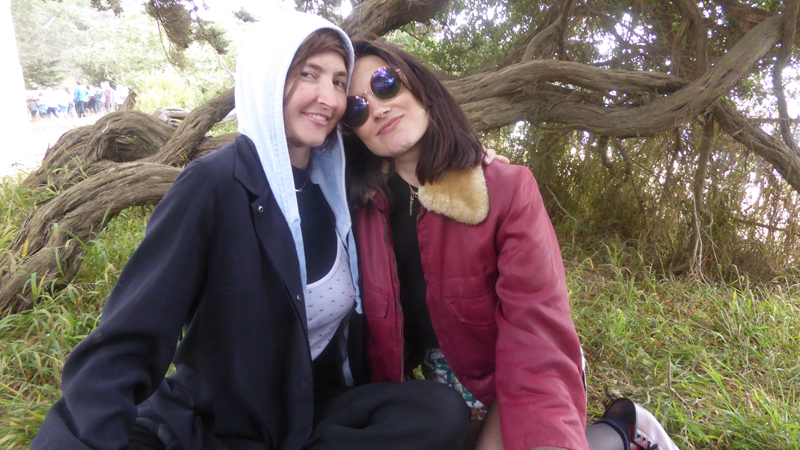Q&A: Talking teamwork, Depeche Mode and sex with Warpaint

Indie rock band Warpaint may be from Los Angeles, but singer-guitarists Emily Kokal and Theresa Wayman call Eugene, Oregon home. I asked to speak to them specifically, because I share their hometown. We’re about the same age, were there at the same time and went to competing high schools. This means we likely went to the same football or soccer games. As a child, Wayman played soccer on the fields below my elementary school.
Depeche Mode, Warpaint
7:30 p.m., Sunday, Oct. 8
SAP Center, San Jose
Tickets: $50-$500.
7:30 p.m., Tuesday, Oct. 10
Oracle Arena, Oakland
Tickets: $60-$500.
Eugene, home to the University of Oregon, is still a small town at heart. It’s proud of its success stories. I met up with Kokal and Wayman at the Outside Lands Music Festival, where we sat cross-legged in a patch of grass, underneath the cypress trees in Golden Gate Park.
Following the festival, they would go on to have one of their only free weeks all year—despite playing a headlining show during that time—before going on tour with pop heartthrob Harry Styles and synth-rockers Depeche Mode. The latter will bring Warpaint, which includes bassist Jenny Lee Lindberg and drummer Stella Mozgawa, back to the Bay Area next week.
We spoke about their third album, 2016’s Heads Up, which blends rock with trip-hop, elements of jazz and hazy psychedelia, switching tempos, styles and influences. Part of that has to do with the way the band recorded. Rather than being in the room together all the time, the members would take turns partnering up to see what they could come up with on their own.
“It’s still collaboration, but there’s a little bit more personal freedom,” Wayman said.
We also chatted about Kokal’s family roots in the East Bay and Warpaint’s goal to bring people closer to the music and to the band. And if their music induces free love among fans, more power to them.
RIFF: What do you enjoy writing about the most?
Emily Kokal: I enjoy writing songs that when I sing them, I feel like they empower me. I like to pick the focuses of things, lately. Maybe a situation I need to work out personally, or I feel like it’s something among me and my friends. Singing it every day or every night would just exorcise any issue or empower any idea; something that has an energy that can be conduced into a positive result.
Theresa Wayman: I like being positive, for sure. I enjoy trying to be as honest as I can, writing about experiences that I have in life that I think people try to brush under the rug. Bringing them to light in a way where people feel like they can relate or be comfortable or open up about those things. I feel like that was really important for me as a listener when I was younger [from] artists I found to be really inspiring. It was incredible to feel like I could relate to these people, who seemed sort of godly to me, in a sense. They were also experiencing these human things that I was experiencing. That’s what I try to aim for.
Do you find your creation process easy or laborious?
Wayman: I think that we have to understand how to work together and compromise, which can make the creation process this whole other thing besides what you would do if you were to write on your own. Sometimes it can seem difficult because you have that added element of trying to understand other people’s point of views and other people’s desires. I might feel like, ‘Oh, this verse should go for this many bars, and that’s so obvious.’ We don’t have any problem about having ideas. It’s just as far as funneling those ideas into a song; it’s a process.
With Heads Up, was it a conscious effort to make an album that sounded different from your previous ones?
Kokal: The conscious effort was out of necessity. We started all making songs separately from each other. This was one part of the process, whereas in the past we’ve always made most of the stuff together in one room. There was somebody at the home of a lot of each of the songs, at least initially. It kind of made things move faster, and also, when you’re at home, and you put a drumbeat down or something, you might make it go a little bit faster. When we are all in a room together, we usually have a groove that’s kind of a little bit slow. Just naturally, the four of us create a sound often that is very a chill BPM. I think that each person did a little bit faster BPM on the songs that they brought in, too, so it just kind of happened that way. We had talked a little bit about doing dancier stuff, too.
You began writing Heads Up by pairing up and working in teams. How were the pairs decided?
Wayman: It would be me and Stella one day, and then it would be me and Jen, and then it would be me and Emily. We changed around. It just ended up working better to start in twos, and end in twos as well.
I imagine it’s a little bit easier to write different sounding songs that way.
Kokal: To kind of cut [the decision-making process] in half and have two people work together, it’s going to get ideas out a little bit more succinctly.
Wayman: If you’re outside the actual rehearsal room, and you’re in your house with one other person in your home studio, you can actually try so many different things that might work for a song and get it exactly how you want it without having the input of the other people—in a good way. And then you bring it to the other people, and they add their input without having your input. You know what I mean?
How much of that initial writing stayed through the end?
Wayman: Less. A lot less.
Kokal: Every single song is a different thing. It wasn’t just pair and pair. Some were all four of us; some were just one person.
Wayman: But for the most part, it was a lot of beginning things at home.

Warpaint at Outside Lands Music Festival at Golden Gate Park in San Francisco on Aug. 12, 2017.
Is there anything about the latest album you would change if you could?
Kokal: I would mix it for three weeks versus three days. Three weeks gives you a little more time to fine-tune your baby.
It’s been a year since you released the album. Warpaint has spent a lot of that time on the road. Now you’re going out on tour with Harry Styles and Depeche Mode. You haven’t had a lot of downtime. What will you do when those tours wind down?
Wayman: We actually have a day-on, day-off schedule for that whole [Depeche Mode] tour, and we’re an opener, so we’re going to have time to feel more relaxed and maybe write.
Kokal: Even though we’re on a big tour, we can shift our focus a little bit to ourselves since we’ll have the backstage and not playing too much.
Wayman: Writing and figuring out what’s next for us. Having downtime right now is hard, for sure.
Kokal: I think next year is going to be a big time of downtime [and] jam time for the band.
So sometime in the coming year, you’re going to work on the next album.
Wayman: Yeah. If you’re in a relationship and all you ever do is your routine, all the time, you start to need to maybe have sex more often. So that’s kind of where we’re at. We need to reconnect in the only way we can, behind closed doors.
I was watching your set, and I had a group of younger fans in their early 20s—
Wayman: And they were like, “What the fuck is this shit?”
No. They were enjoying the music so much that they started, like, a five-way orgy, maybe like you teamed up to write, in pairs.
Both: Oooh!
Kokal: That’s what we’re best at: bringing people together physically. I guess if you think about it, if we are trying to come from a place of connection, the best results are that people are connecting to each other and us at the same time. We get to be a part of your five-way.
Wayman: If you want to know what we try to write songs about, it’s about five-way orgies.
Kokal: Aaand, goodnight.
There’s few things more “San Francisco” than chilling at Golden Gate Park. Do you have any favorite experiences in the Bay Area?
Kokal: Spending every summer in the East Bay my whole childhood. My mom and her family are from Alamo, so right by Walnut Creek. My grandma was a librarian [there].
Yeah, I live in Walnut Creek.
Wayman: You guys, same, same again!
Kokal: My uncle ran the … center for the arts there. I’m very East Bay, so when we come here, for me it’s kind of like a return.
Follow Roman Gokhman at Twitter.com/RomiTheWriter.
